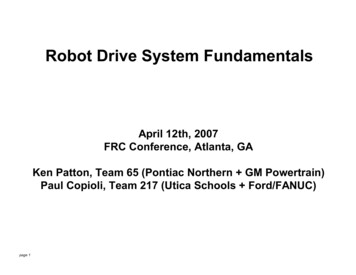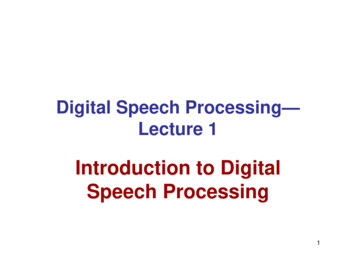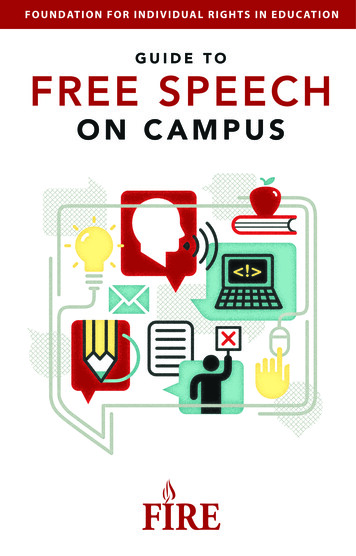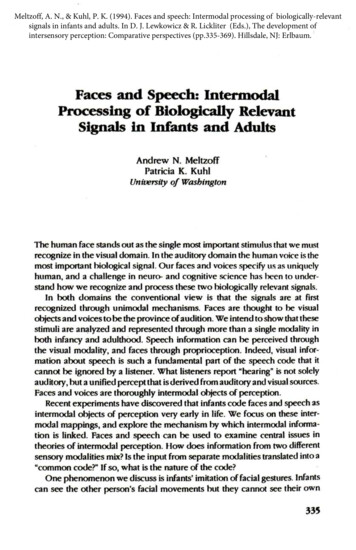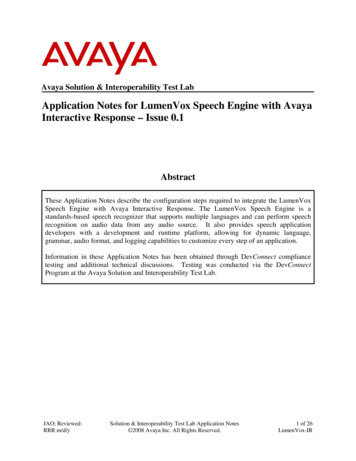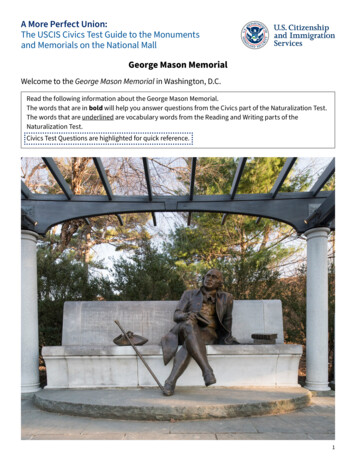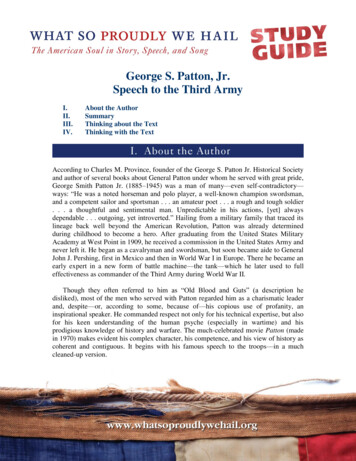
Transcription
George S. Patton, Jr.Speech to the Third ArmyI.II.III.IV.About the AuthorSummaryThinking about the TextThinking with the TextAccording to Charles M. Province, founder of the George S. Patton Jr. Historical Societyand author of several books about General Patton under whom he served with great pride,George Smith Patton Jr. (1885–1945) was a man of many—even self-contradictory—ways: “He was a noted horseman and polo player, a well-known champion swordsman,and a competent sailor and sportsman . . . an amateur poet . . . a rough and tough soldier. . . a thoughtful and sentimental man. Unpredictable in his actions, [yet] alwaysdependable . . . outgoing, yet introverted.” Hailing from a military family that traced itslineage back well beyond the American Revolution, Patton was already determinedduring childhood to become a hero. After graduating from the United States MilitaryAcademy at West Point in 1909, he received a commission in the United States Army andnever left it. He began as a cavalryman and swordsman, but soon became aide to GeneralJohn J. Pershing, first in Mexico and then in World War I in Europe. There he became anearly expert in a new form of battle machine—the tank—which he later used to fulleffectiveness as commander of the Third Army during World War II.Though they often referred to him as “Old Blood and Guts” (a description hedisliked), most of the men who served with Patton regarded him as a charismatic leaderand, despite—or, according to some, because of—his copious use of profanity, aninspirational speaker. He commanded respect not only for his technical expertise, but alsofor his keen understanding of the human psyche (especially in wartime) and hisprodigious knowledge of history and warfare. The much-celebrated movie Patton (madein 1970) makes evident his complex character, his competence, and his view of history ascoherent and contiguous. It begins with his famous speech to the troops—in a muchcleaned-up version.
General Patton’s speech to the Third Army was given on June 5, 1944, the eve of theAllied invasion of Europe. This third-person account of the speech comes from TheUnknown Patton by Charles M. Province, who compiled it from innumerable sources.The first part presents the background, the second the speech itself, interrupted by briefcomments on the reaction of the troops. Readers will no doubt be struck by Patton’s harshand often foul language, and his profuse reliance on profanity. But they should not makethe mistake of thinking that Patton had not carefully rehearsed every word, chosenprecisely for its desired persuasive effect. The speech repays careful analysis, and, whenone identifies the problems it is designed to address, its genius and power will becomeevident.General Patton, a lifelong professional soldier born into a family of professional soldiers,addresses civilian soldiers—most of them draftees—the majority of whom had never yetbeen in battle. We examine the speech mainly to discover how it seeks to accomplish itsrhetorical purposes. We are also interested in what it reveals about the nature ofleadership in the American democratic republic. On all these matters, comparison withChamberlain’s speech to the mutineers will prove instructive.A. The Rhetorical Situation1. What are Patton’s concerns about his men?2. What fears and hopes does he have to address?3. What does he want to accomplish by his speech?IN CONVERSATIONIn this conversation, Amy A. Kass and Leon R. Kass discuss Patton’s speech with Eliot A. Cohen,Robert E. Osgood Professor of Strategic Studies at the Paul H. Nitze School of AdvancedInternational Studies at the Johns Hopkins University.
Amy Kass: I think Patton’s men are young and untried. They’ve never been inreal battle. Patton is, number one, speaking to their fear of death, and number two,to their fear of killing and being killed.He is also speaking to their fear of being cowards. He says first of all, “Why areyou fighting? You’re fighting for your homeland, and for your families.” That’sduty. “You’re fighting for your self-respect.” That’s honor. “But you’re alsofighting because you’re men, real men.”So he’s doing what Chamberlain was doing—he’s appealing to the better angelsof their nature, but in a very, very different way.Leon Kass: They have never been in battle. The major rhetorical problem is toaddress and try to help them curb their fears and also to inspire them to fight andto fight zealously.For more discussion on this question, watch the videos online atwww.whatsoproudlywehail.org.B. The Rhetorical Strategy1. How does Patton address the fears and hopes of his men? How much does hedo directly? How much does he do indirectly? Under similar circumstances,what appeal would best address your own fears and hopes?2. To what does he mainly appeal: honor, duty, manhood and manliness, prideand shame, identification with team or country or himself, desire for glory andreputation, hatred of the enemy, purpose of the war, or American principlesand ideals? Why do you think he emphasizes the things he does?IN CONVERSATIONLeon Kass: The very first thing Patton does is he appeals to American manliness,America’s love of victory, and Americans’ love for their own families and homes,love of their own honor, and love of their own manhood. He tells them that
America despises cowards.After that introduction, he directly addresses their fear of death. And it’swonderful. In the first line he says: “All of you are not going to die. Actually onlyabout two percent of you are going to die. Everyone’s scared. Anybody who sayshe’s not scared is lying. But a real man won’t let his fear of death overpower hishonor, his sense of duty to his country, or his innate manhood.”Then he goes on to say: “Look, battle is the most magnificent competition. It iswhere the best comes out; it is where one overcomes all that is base. Americanspride themselves on being he-men, and they really are he-men. And by the way,the enemy’s just as frightened as you are.”Eliot Cohen: This is basically an appeal to manhood; isn’t it? He is speaking tomen. He says, “Men, this stuff that some sources sling around about Americawanting out of this war, not wanting to fight, is a crock of bullshit. Americanslove to fight, traditionally. All Americans love the sting and clash of battle.”Leon Kass: Patton couldn’t get away with making such a speech today, but Iwould imagine there are lots of young men, for better and for worse, who wouldrespond in the same way as the people spoken to in this speech. There really issomething about the appeal to courage and the appeal to using your courage in theservice of something honorable.Eliot Cohen: I think that’s right. It is what inspires a lot of people, particularlyyoung males, to volunteer.For more discussion on this question, watch the videos online atwww.whatsoproudlywehail.org.3. What is the function of Patton’s profanity? What are its effects on the men—and why is it effective? How might these effects contribute to attainingPatton’s overall purpose?
IN CONVERSATIONEliot Cohen: This is a very different sort of speech than that made byChamberlain. It is a profane and vulgar speech with a lot of scatologicalreferences and a number of sexual references.Amy Kass: We also know that Patton was not really a profane speaker. He didn’tspeak like that normally. He actually used to practice in front of a mirror. And theother wonderful thing he does with this speech is the gift that he leaves them withat the end, which is what they can tell their grandchildren. “When you’re old andyour grandchild is sitting on your knee and asks you, ‘What were you doingduring the war, the big war?’”Eliot Cohen: Right, and part of it is about the great Third Army, and part of it isabout George S. Patton.Amy Kass: No, Georgie Patton. He doesn’t even refer to himself with the propertitle.Leon Kass: This is another instance of what we talked about with theChamberlain speech. Patton is trying once again to dissemble his superiority andmake a team of which he’s also a member. It is not just that they’re going toremember that they fought with Georgie Patton, but they’re going to swear likeGeorgie Patton when they’re talking to their grandchild. That’s what he has themsay. What he wants them to say is to refer to him in the same way that he refers toeverybody else. The profanity is a way of cutting the tension, reducing the fear,and making them feel like a team with him. They laugh uproariously. They slaptheir thighs in all of those places, and he makes them a team even before he startsspeaking of the army as a team. And it’s a team in which he is the star player.For more discussion on this question, watch the videos online atwww.whatsoproudlywehail.org.C. Analysis of the Speech
Imagine yourself in the audience of soldiers. Pause after each paragraph and try toassess what he said, why he said it, and what effect it would have had on you.1. The Opening Paragraph (3): How does Patton begin? To what does he firstappeal? Are the reasons he suggests that the men are gathered, ready to fight,plausible to you?2. Second Paragraph, a direct address to the fear of dying (4): Here Patton makesmany separate points. Why so many? Why this order? Which appeal is mostpowerful: to honor, to duty, to country, or to manhood? Does he succeed herein quieting your fear of death? Why or why not?3. Third Paragraph, about alertness (4): What is the point? Why make it here?4. Paragraphs Four to Eight, about the army as a team (4–5): Trace the severalstages in this presentation of the army as a team, with each person having acrucial part to play. How does this section help address the men’s fears? Doesthe laughter at the beginning help make the men a team?5. Paragraph Nine, about keeping Patton’s presence a secret (6): Why is this here?6. Paragraph Ten, the purple-prose paragraph about the mission—to clean up theGerman mess and to clean out the Japanese nest, “before the [* #% ] Marinesget all the credit” (6): In the next paragraph, Province remarks: “Thisstatement had real significance behind it. . . . [The men] knew that theythemselves were going to play a very great part in the making of worldhistory.” Do you see that deep meaning in what Patton said and in how he saidit?7. Paragraphs Eleven to Fourteen, about advancing and pushing hard (7–8): Howdo these paragraphs speak to the fears and hopes of the men?8. Last Paragraph, on what you will be able to say after the war (8): What isaccomplished by this closing? Notice especially the very last sentence and thespeech Patton invents for you to make to your grandson: What is the effect ofthat closing, both for your fears and hopes and for your relation to your teamand its leaders? Why does he have you speaking in imitation of his ownprofanity-laced speech?D. Comparison with Chamberlain’s SpeechChamberlain and Patton were addressing different sorts of soldiers, under greatlydifferent circumstances and requiring different rhetorical appeals. Nevertheless, somecomparisons are fruitful.
1. Unlike Chamberlain, Patton never mentions the causes of the war or thereasons that Americans were fighting it. Why not? Given the circumstances, isthis a significant omission?2. Also unlike Chamberlain, Patton never seems to appeal to specificallyAmerican principles and ideals in trying to inspire the men. Why not? Giventhe circumstances, is this a significant omission?3. Is Patton’s appeal for manly courage in battle, and the arguments he uses tomake it, independent of the cause for which the men are being summoned tofight? Could the same speech have been made by a German or Japanesegeneral to his soldiers?4. Compare the ways in which Chamberlain and Patton attempt to gain theconfidence and trust of their men. What is to be said for and against the waysof each?5. Would either of these speeches work today? Could the speakers get away withtheir high-minded appeals to manliness or national greatness and superiority?Their degradation of the enemy? The use of profanity? Even if they wereallowed to make these appeals, in these ways, would they be successful withcontemporary auditors without consciously being more cynical or ironical intheir speech and thought? Whose speech—if either of them—would be mostat home in our modern era?—or are they both simply relics of a bygone past?Patton’s speech, like Chamberlain’s, invites questions about the importance of courageand self-sacrifice, as well as the difficulty in obtaining them. It also raises interestingquestions about leadership and about the military in American society. (Many of thefollowing questions were asked also in the Shaara/Chamberlain Discussion Guide.)A. Encouraging Courage and Self-Sacrifice1. What is courage? What makes it so difficult? Is Patton’s definition of courage—fighting even though scared—correct? Is there more to courage than thisdefinition?
IN CONVERSATIONEliot Cohen: “Battle is the most magnificent competition in which a humanbeing can indulge. It brings out all that is best; it removes all that is base.” Do youbelieve that?Leon Kass: Do I believe that’s simply true? It’d take some discussion, and I’dprobably wind up saying no.But there is a sense in which battle is where a person has a chance to put his entirelife on the line with his own valor and his own prowess and serve somethinggreater than himself and serve the people next to him.Amy Kass: It’s also not an accident that ancient epics were all about battle.Leon Kass: Or that the Greek word for courage, andreia, is the virtue of themale, of the he-man, as if there is something about rolling your entire life up intoone moment and asking yourself how will you stand with respect to your ownfinitude, and will you distinguish yourself, conquering your fears and doing yourduty, or will you fail?Eliot Cohen: But what do you think he denounces in all this? He denounces aview of courage. He denounces the idea of individual heroism. I don’t think this issimply about courage in the narrow sense. He wants everyone to understand thateveryone has an important role to play. What is the one heroic example that hetalks about? It is the guy who is shimmying up a telephone pole to fix a wire. It isnot somebody who is actually going out and killing a German. It is someone whois doing his duty despite fear, and he is doing it well.For more discussion on this question, watch the videos online atwww.whatsoproudlywehail.org.2. How can one get ordinary citizens—especially in a republic dedicated tosafeguarding their rights to life, liberty, and the pursuit of happiness—to risktheir lives in the service of the nation? Conversely, how do you temper a
martial spirit and the love of war and glory? Which is the bigger challenge inmodern American life?3. How exactly does one encourage public-spiritedness and self-sacrifice? Howeffective can speech be toward this goal? What sorts of speech? By whom?4. How important—and effective—are honor and duty for inspiring men to fight?Is there a difference between fighting for your honor and manhood—to avoidbeing a coward—and fighting for a cause or for public service? Which is morelikely to inspire people today to fight?5. Is patriotism—love of country—necessary for the common defense? How canit be instilled in ordinary citizens? How can it be summoned?6. Should military service—or some other form of national service—be a civicduty? Why or why not?7. What is the difference between military courage (and military service) andother sorts of courage (and public service)? Give concrete examples of civiccourage not related to war. Which sort of courage do you regard as mostimportant? Why?IN CONVERSATIONEliot Cohen: Isn’t there as much need for civic courage, including, frequently,individual courage?As I was reading through it, I was reflecting on the television series that had ahuge impact on me growing up, Profiles in Courage, which was a televisionversion of John F. Kennedy’s award-winning book. I was very struck by thenumber of cases in the show of people showing enormous courage, which usuallymeant standing alone against their own crowd—John Adams, for example, beingwilling to defend the soldiers accused at the Boston Massacre. Isn’t that kind ofcourage as necessary for the continuation of the republic as martial courage?Amy Kass: Definitely yes. Courage is necessary in civilian life. Part of the reasonwe have martial courage here is that one is literally putting one’s life on the line,so what is at stake is something a bit different.Leon Kass: Well, it’s not just that the stakes are different. What are the virtues
that citizens are called upon to display? The first thing called upon is to practicesome sort of self-command and to earn some self-respect, if they have their ownhouse in order. Second, they’re obliged to be law-abiding and also have somecare for the doing of justice. But then there is the question of what happens whenthe polity as a whole is threatened, and therefore the question becomes: Don’t weneed people who are willing to make the sacrifice and to display courage againstthe fear of great evil, the fear of death, when the polity itself and its own existenceand safety are on the line?For more discussion on this question, watch the videos online atwww.whatsoproudlywehail.org.B. Leadership and the Military1. What are the virtues necessary for leaders in a democratic republic? Are thevirtues needed for military leaders different from those of civilian leaders?2. On the one hand, we Americans want excellent leaders, people whom we canadmire and follow. On the other hand, we Americans do not wish to be led,and we do not believe that some people are really better than others. Whatdoes this tension imply for leadership in America? Which of the two militarycommanders, Chamberlain or Patton, would you rather follow? Why?3. The United States maintains civil control of the military. It also has a volunteerarmy, comprising mainly citizens who serve for only a short time, who are notand will not become professional soldiers. These citizen-soldiers are,however, ruled by a cadre of professional soldiers whose entire career is spentin uniform. What special challenges of leadership do these arrangementsproduce?
According to Charles M. Province, founder of the George S. Patton Jr. Historical Society and author of several books about General Patton under whom he served with great pride, George Smith Patton Jr. (1885-1945) was a man of many—even self-contradictory— ways: "He was a noted horseman and polo player, a well-known champion swordsman,

